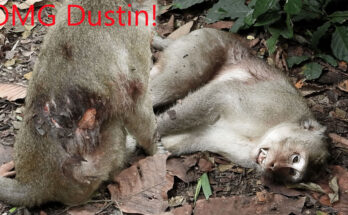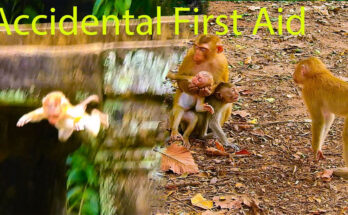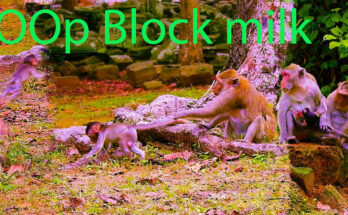In the heart of the dense rainforest, where the towering trees whispered in the wind and the sounds of the wild echoed through the canopy, a heartbreaking scene unfolded. A mother monkey, desperate and frantic, sat on a thick tree branch, her mournful cries filling the air. She called out for her baby, little Briar, but there was no answer.
Briar, a tiny and fragile infant, had been separated from his mother under tragic circumstances. The jungle was full of dangers—predators lurking in the shadows, rival monkey troops invading territories, and the constant struggle to find food. But this time, the greatest danger had come from humans.
A group of poachers had invaded the forest, setting traps to capture baby monkeys for the illegal pet trade. Briar, still too small to understand the danger, had wandered just a little too far from his mother. In the blink of an eye, rough hands had snatched him away. He cried out, his tiny voice trembling with fear, but his mother was too late. She rushed forward, shrieking in distress, but the humans had already disappeared into the thick vegetation.
The jungle, once a place of safety, now felt cruel and empty. The mother monkey searched desperately, moving from tree to tree, calling out with a grief-stricken voice. Other members of the troop watched but did not interfere. In the wild, each mother fought her own battles, and this one was hers alone.
But hope was not lost.
The Global Nature Organization (G.N.O.), a team dedicated to rescuing and rehabilitating endangered wildlife, had been tracking poacher activity in the region. When they discovered the signs of recent capture—a broken branch, scattered leaves, and faint cries—they knew they had to act fast.
Following the trail through the jungle, the rescue team came upon a hidden camp where several small cages were placed carelessly on the ground. Inside one of them, huddled in a corner, was Briar. His tiny body trembled, and his big, fearful eyes darted around, searching for his mother. His soft cries barely escaped through the bars, but they were enough. The team knew he had to be saved.
With careful precision, the rescuers waited for the right moment. When the poachers left the camp unattended, they moved in swiftly, opening the cages and freeing the terrified infants. Briar, weak from fear and hunger, clung to the arms of one of the rescuers as they wrapped him in a soft cloth.
It was time to take him home.
As the team made their way back to the jungle, Briar remained silent, exhausted from his ordeal. But the moment they reached the familiar trees where his troop lived, something changed. A distant cry echoed through the forest—a call filled with sorrow and desperation.
His mother was still searching for him.
The rescuers, understanding the deep bond between a mother and her baby, gently placed Briar on a low branch and stepped back. The tiny monkey lifted his head, his ears twitching at the familiar sound. Then, with the little strength he had left, he let out a soft whimper in return.
High above, the mother monkey froze. She turned her head sharply, her eyes scanning the trees, hope flickering in her gaze. Then, she moved—fast, almost flying through the branches—toward the source of the tiny cry.
And then, finally, they saw each other.
With a desperate leap, the mother reached her baby, scooping him up into her arms and holding him tight. She pressed him close, sniffing him frantically, checking to make sure he was real. Briar clung to her with all his might, his small body finally safe where he belonged.
The rescuers watched in silence, their hearts full. They had done their job. Thanks to G.N.O, Briar was back where he belonged, and the mother’s cries of sorrow turned into soft, relieved murmurs as she carried her baby away, disappearing into the safety of the jungle.


